Project Manager's Transformative Role in Telecoms in Nigeria
VerifiedAdded on 2022/12/05
|89
|26690
|284
Thesis and Dissertation
AI Summary
This dissertation investigates the pivotal role of project managers in transforming the operational landscape of Nigerian telecom companies through the implementation of enterprise management systems (EMS). The research explores how project managers act as change agents, enhancing work coordination and overall efficiency within these organizations. The study examines the key drivers of ERP systems, the implementation processes, and the project manager's responsibilities in this context. Employing both qualitative and quantitative research methodologies, including surveys and interviews conducted with NTEL and 9Mobile, the dissertation analyzes the impact of project managers' decision-making skills, particularly in areas such as budget management, timeline scheduling, and inter-departmental cooperation. The findings highlight the importance of effective communication and coordinated operations in streamlining business units and achieving common objectives. The research concludes by emphasizing the critical role of the project manager in fostering stability and sustainability within the telecom industry by adapting to the fast-changing needs of customers and leveraging the benefits of EMS.
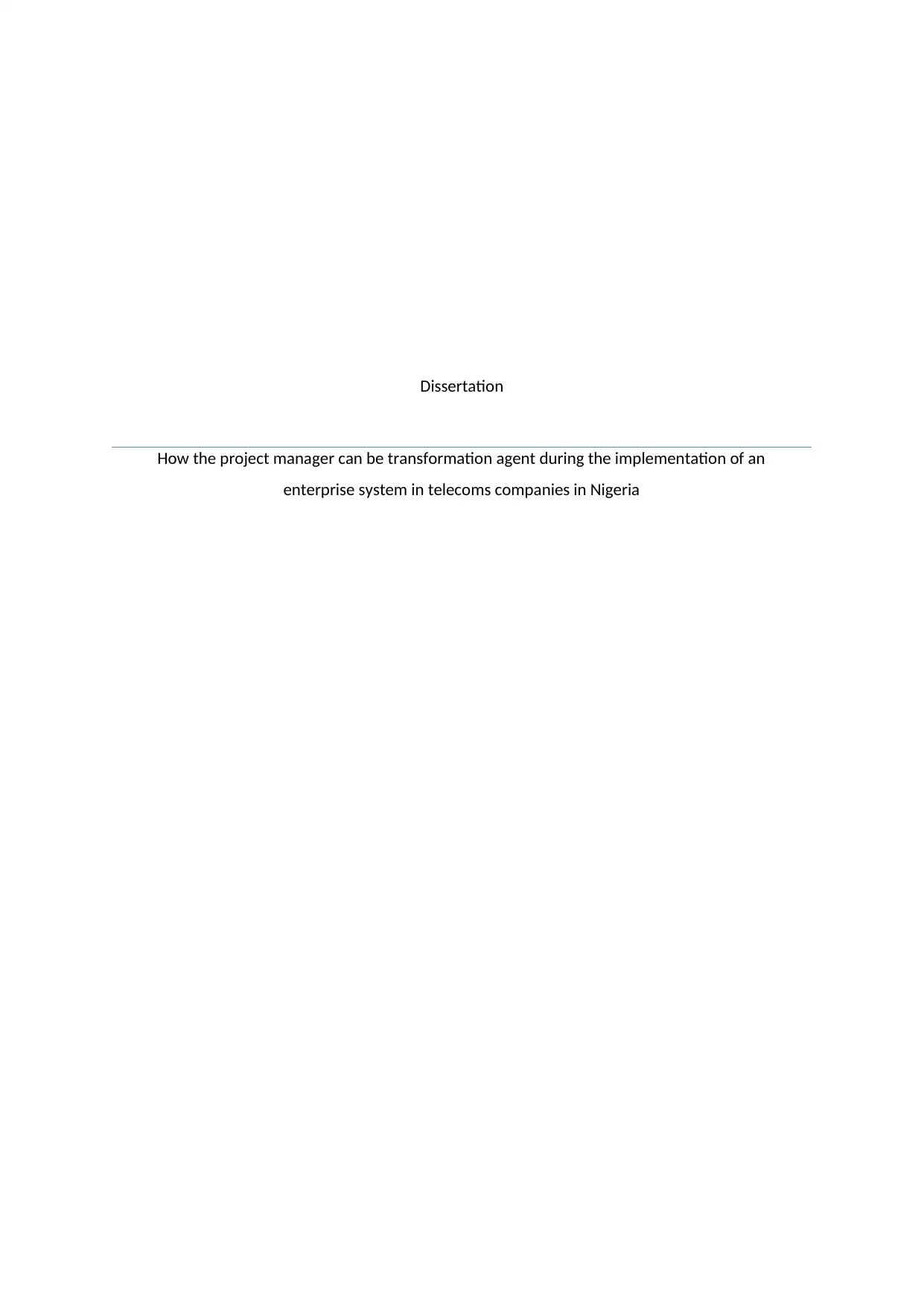
Dissertation
How the project manager can be transformation agent during the implementation of an
enterprise system in telecoms companies in Nigeria
How the project manager can be transformation agent during the implementation of an
enterprise system in telecoms companies in Nigeria
Paraphrase This Document
Need a fresh take? Get an instant paraphrase of this document with our AI Paraphraser
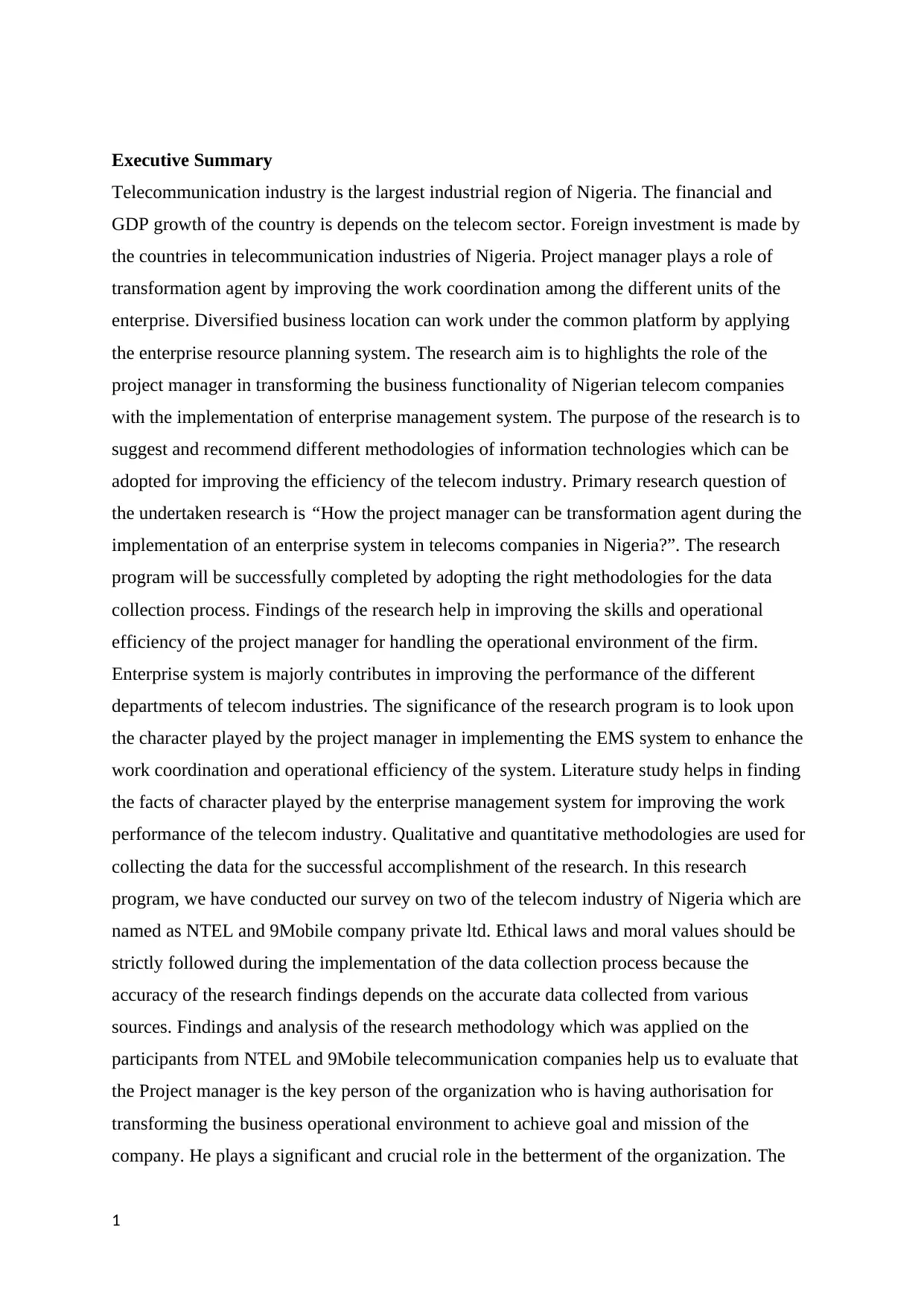
Executive Summary
Telecommunication industry is the largest industrial region of Nigeria. The financial and
GDP growth of the country is depends on the telecom sector. Foreign investment is made by
the countries in telecommunication industries of Nigeria. Project manager plays a role of
transformation agent by improving the work coordination among the different units of the
enterprise. Diversified business location can work under the common platform by applying
the enterprise resource planning system. The research aim is to highlights the role of the
project manager in transforming the business functionality of Nigerian telecom companies
with the implementation of enterprise management system. The purpose of the research is to
suggest and recommend different methodologies of information technologies which can be
adopted for improving the efficiency of the telecom industry. Primary research question of
the undertaken research is “How the project manager can be transformation agent during the
implementation of an enterprise system in telecoms companies in Nigeria?”. The research
program will be successfully completed by adopting the right methodologies for the data
collection process. Findings of the research help in improving the skills and operational
efficiency of the project manager for handling the operational environment of the firm.
Enterprise system is majorly contributes in improving the performance of the different
departments of telecom industries. The significance of the research program is to look upon
the character played by the project manager in implementing the EMS system to enhance the
work coordination and operational efficiency of the system. Literature study helps in finding
the facts of character played by the enterprise management system for improving the work
performance of the telecom industry. Qualitative and quantitative methodologies are used for
collecting the data for the successful accomplishment of the research. In this research
program, we have conducted our survey on two of the telecom industry of Nigeria which are
named as NTEL and 9Mobile company private ltd. Ethical laws and moral values should be
strictly followed during the implementation of the data collection process because the
accuracy of the research findings depends on the accurate data collected from various
sources. Findings and analysis of the research methodology which was applied on the
participants from NTEL and 9Mobile telecommunication companies help us to evaluate that
the Project manager is the key person of the organization who is having authorisation for
transforming the business operational environment to achieve goal and mission of the
company. He plays a significant and crucial role in the betterment of the organization. The
1
Telecommunication industry is the largest industrial region of Nigeria. The financial and
GDP growth of the country is depends on the telecom sector. Foreign investment is made by
the countries in telecommunication industries of Nigeria. Project manager plays a role of
transformation agent by improving the work coordination among the different units of the
enterprise. Diversified business location can work under the common platform by applying
the enterprise resource planning system. The research aim is to highlights the role of the
project manager in transforming the business functionality of Nigerian telecom companies
with the implementation of enterprise management system. The purpose of the research is to
suggest and recommend different methodologies of information technologies which can be
adopted for improving the efficiency of the telecom industry. Primary research question of
the undertaken research is “How the project manager can be transformation agent during the
implementation of an enterprise system in telecoms companies in Nigeria?”. The research
program will be successfully completed by adopting the right methodologies for the data
collection process. Findings of the research help in improving the skills and operational
efficiency of the project manager for handling the operational environment of the firm.
Enterprise system is majorly contributes in improving the performance of the different
departments of telecom industries. The significance of the research program is to look upon
the character played by the project manager in implementing the EMS system to enhance the
work coordination and operational efficiency of the system. Literature study helps in finding
the facts of character played by the enterprise management system for improving the work
performance of the telecom industry. Qualitative and quantitative methodologies are used for
collecting the data for the successful accomplishment of the research. In this research
program, we have conducted our survey on two of the telecom industry of Nigeria which are
named as NTEL and 9Mobile company private ltd. Ethical laws and moral values should be
strictly followed during the implementation of the data collection process because the
accuracy of the research findings depends on the accurate data collected from various
sources. Findings and analysis of the research methodology which was applied on the
participants from NTEL and 9Mobile telecommunication companies help us to evaluate that
the Project manager is the key person of the organization who is having authorisation for
transforming the business operational environment to achieve goal and mission of the
company. He plays a significant and crucial role in the betterment of the organization. The
1
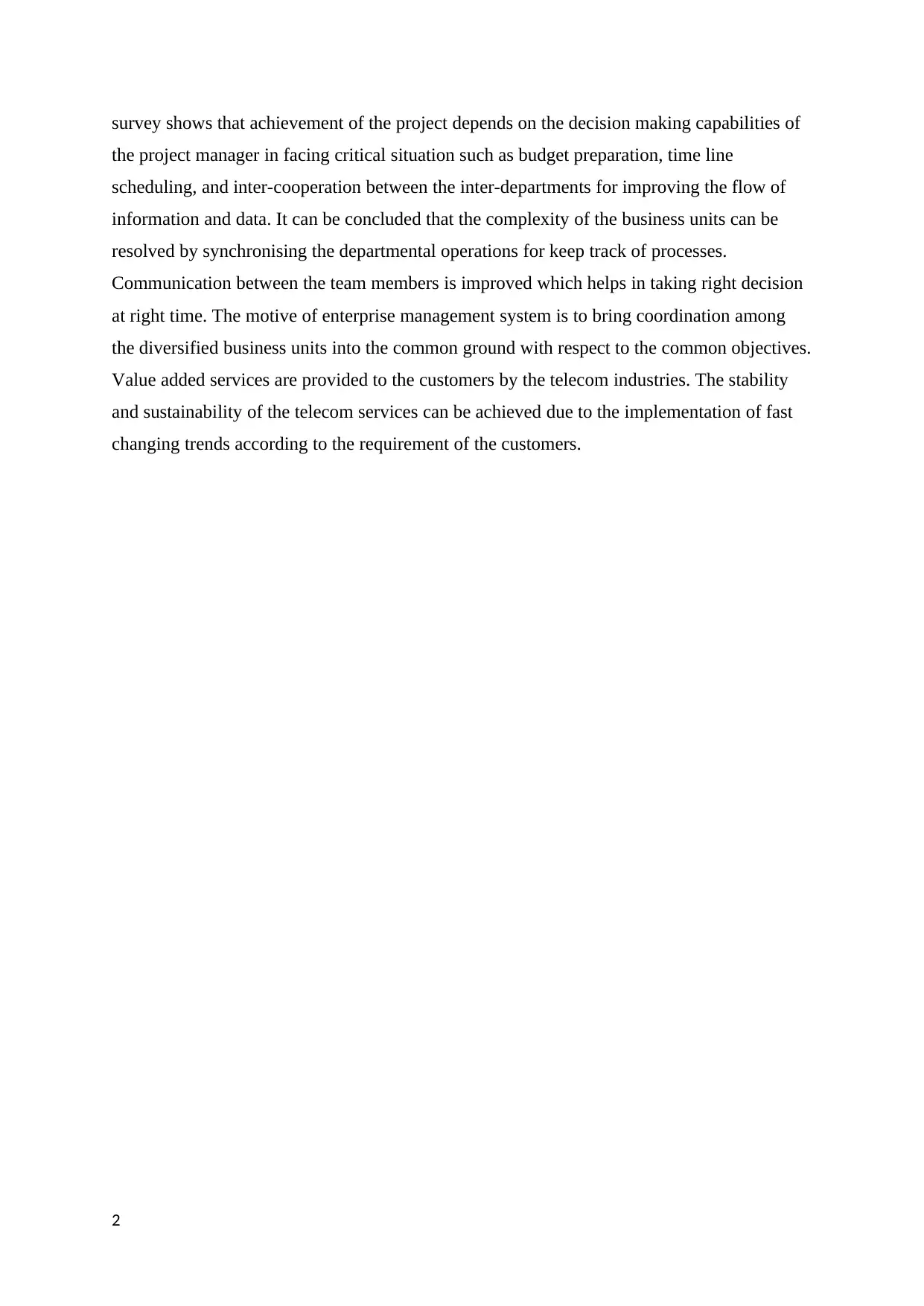
survey shows that achievement of the project depends on the decision making capabilities of
the project manager in facing critical situation such as budget preparation, time line
scheduling, and inter-cooperation between the inter-departments for improving the flow of
information and data. It can be concluded that the complexity of the business units can be
resolved by synchronising the departmental operations for keep track of processes.
Communication between the team members is improved which helps in taking right decision
at right time. The motive of enterprise management system is to bring coordination among
the diversified business units into the common ground with respect to the common objectives.
Value added services are provided to the customers by the telecom industries. The stability
and sustainability of the telecom services can be achieved due to the implementation of fast
changing trends according to the requirement of the customers.
2
the project manager in facing critical situation such as budget preparation, time line
scheduling, and inter-cooperation between the inter-departments for improving the flow of
information and data. It can be concluded that the complexity of the business units can be
resolved by synchronising the departmental operations for keep track of processes.
Communication between the team members is improved which helps in taking right decision
at right time. The motive of enterprise management system is to bring coordination among
the diversified business units into the common ground with respect to the common objectives.
Value added services are provided to the customers by the telecom industries. The stability
and sustainability of the telecom services can be achieved due to the implementation of fast
changing trends according to the requirement of the customers.
2
⊘ This is a preview!⊘
Do you want full access?
Subscribe today to unlock all pages.

Trusted by 1+ million students worldwide
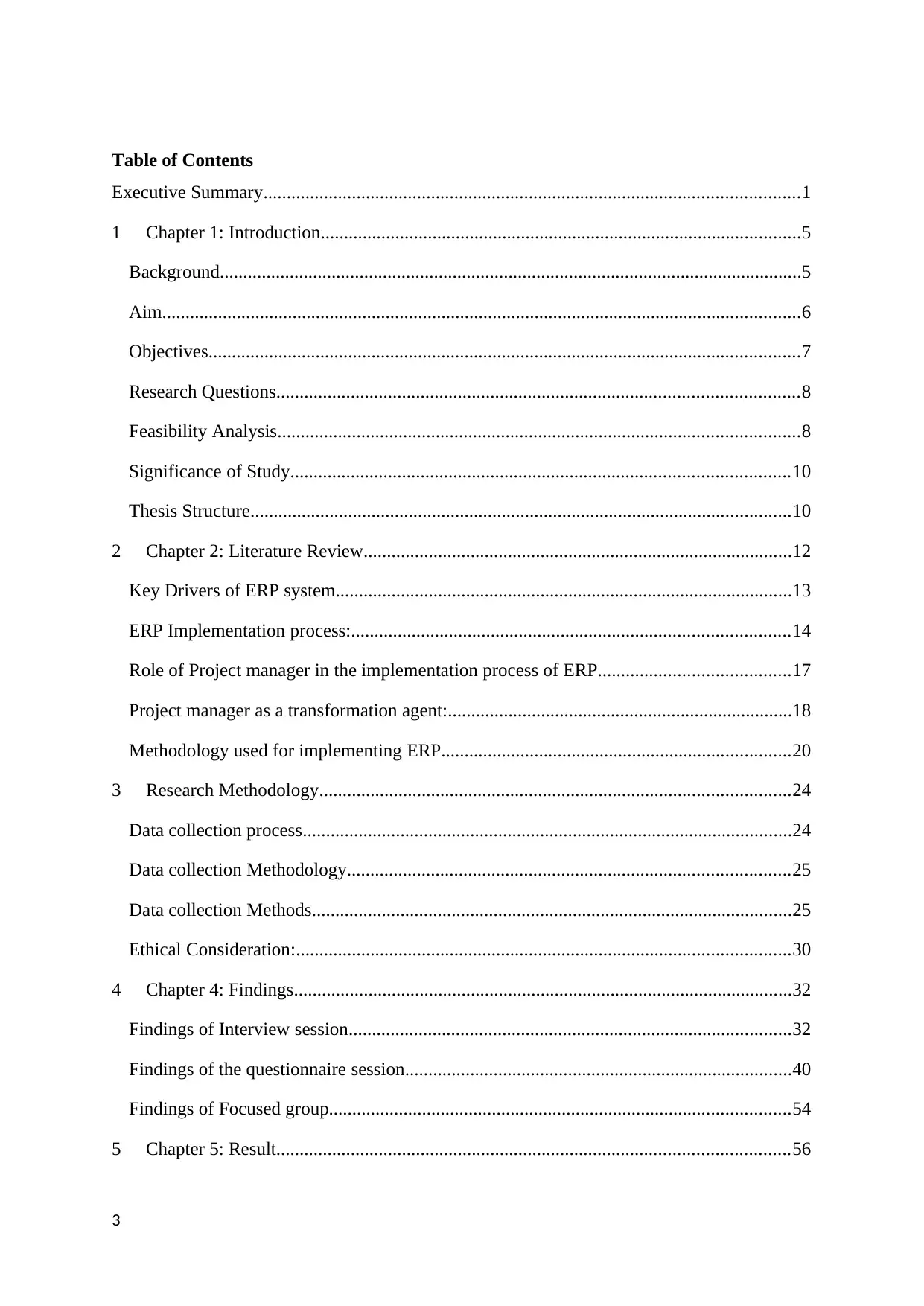
Table of Contents
Executive Summary...................................................................................................................1
1 Chapter 1: Introduction.......................................................................................................5
Background.............................................................................................................................5
Aim.........................................................................................................................................6
Objectives...............................................................................................................................7
Research Questions................................................................................................................8
Feasibility Analysis................................................................................................................8
Significance of Study...........................................................................................................10
Thesis Structure....................................................................................................................10
2 Chapter 2: Literature Review............................................................................................12
Key Drivers of ERP system..................................................................................................13
ERP Implementation process:..............................................................................................14
Role of Project manager in the implementation process of ERP.........................................17
Project manager as a transformation agent:..........................................................................18
Methodology used for implementing ERP...........................................................................20
3 Research Methodology.....................................................................................................24
Data collection process.........................................................................................................24
Data collection Methodology...............................................................................................25
Data collection Methods.......................................................................................................25
Ethical Consideration:..........................................................................................................30
4 Chapter 4: Findings...........................................................................................................32
Findings of Interview session...............................................................................................32
Findings of the questionnaire session...................................................................................40
Findings of Focused group...................................................................................................54
5 Chapter 5: Result..............................................................................................................56
3
Executive Summary...................................................................................................................1
1 Chapter 1: Introduction.......................................................................................................5
Background.............................................................................................................................5
Aim.........................................................................................................................................6
Objectives...............................................................................................................................7
Research Questions................................................................................................................8
Feasibility Analysis................................................................................................................8
Significance of Study...........................................................................................................10
Thesis Structure....................................................................................................................10
2 Chapter 2: Literature Review............................................................................................12
Key Drivers of ERP system..................................................................................................13
ERP Implementation process:..............................................................................................14
Role of Project manager in the implementation process of ERP.........................................17
Project manager as a transformation agent:..........................................................................18
Methodology used for implementing ERP...........................................................................20
3 Research Methodology.....................................................................................................24
Data collection process.........................................................................................................24
Data collection Methodology...............................................................................................25
Data collection Methods.......................................................................................................25
Ethical Consideration:..........................................................................................................30
4 Chapter 4: Findings...........................................................................................................32
Findings of Interview session...............................................................................................32
Findings of the questionnaire session...................................................................................40
Findings of Focused group...................................................................................................54
5 Chapter 5: Result..............................................................................................................56
3
Paraphrase This Document
Need a fresh take? Get an instant paraphrase of this document with our AI Paraphraser

6 Chapter 6: Discussion.......................................................................................................65
Project Manager as a transformation agent by using ERP:..................................................68
7 Chapter 7: Conclusion......................................................................................................73
8 References.........................................................................................................................76
4
Project Manager as a transformation agent by using ERP:..................................................68
7 Chapter 7: Conclusion......................................................................................................73
8 References.........................................................................................................................76
4
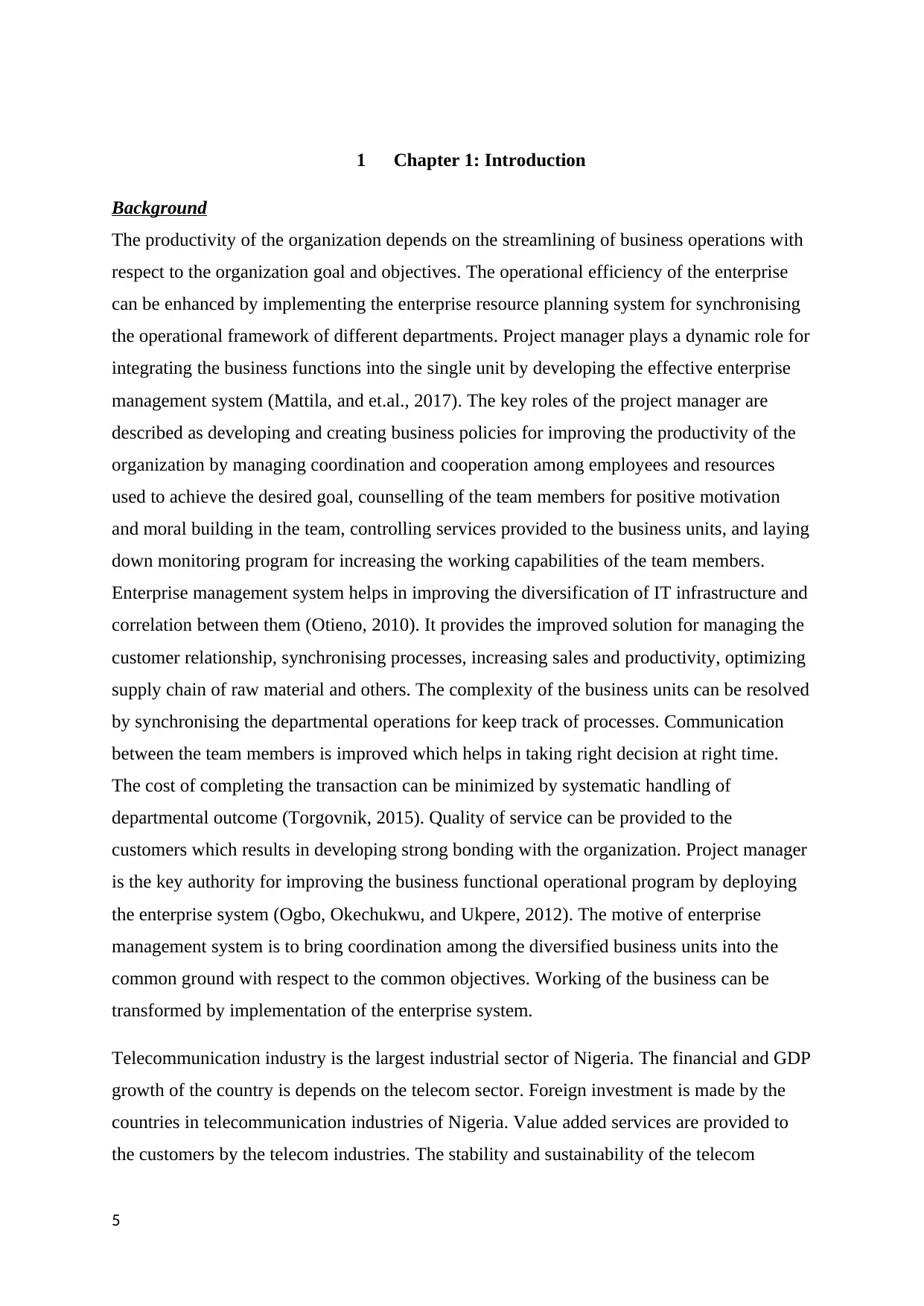
1 Chapter 1: Introduction
Background
The productivity of the organization depends on the streamlining of business operations with
respect to the organization goal and objectives. The operational efficiency of the enterprise
can be enhanced by implementing the enterprise resource planning system for synchronising
the operational framework of different departments. Project manager plays a dynamic role for
integrating the business functions into the single unit by developing the effective enterprise
management system (Mattila, and et.al., 2017). The key roles of the project manager are
described as developing and creating business policies for improving the productivity of the
organization by managing coordination and cooperation among employees and resources
used to achieve the desired goal, counselling of the team members for positive motivation
and moral building in the team, controlling services provided to the business units, and laying
down monitoring program for increasing the working capabilities of the team members.
Enterprise management system helps in improving the diversification of IT infrastructure and
correlation between them (Otieno, 2010). It provides the improved solution for managing the
customer relationship, synchronising processes, increasing sales and productivity, optimizing
supply chain of raw material and others. The complexity of the business units can be resolved
by synchronising the departmental operations for keep track of processes. Communication
between the team members is improved which helps in taking right decision at right time.
The cost of completing the transaction can be minimized by systematic handling of
departmental outcome (Torgovnik, 2015). Quality of service can be provided to the
customers which results in developing strong bonding with the organization. Project manager
is the key authority for improving the business functional operational program by deploying
the enterprise system (Ogbo, Okechukwu, and Ukpere, 2012). The motive of enterprise
management system is to bring coordination among the diversified business units into the
common ground with respect to the common objectives. Working of the business can be
transformed by implementation of the enterprise system.
Telecommunication industry is the largest industrial sector of Nigeria. The financial and GDP
growth of the country is depends on the telecom sector. Foreign investment is made by the
countries in telecommunication industries of Nigeria. Value added services are provided to
the customers by the telecom industries. The stability and sustainability of the telecom
5
Background
The productivity of the organization depends on the streamlining of business operations with
respect to the organization goal and objectives. The operational efficiency of the enterprise
can be enhanced by implementing the enterprise resource planning system for synchronising
the operational framework of different departments. Project manager plays a dynamic role for
integrating the business functions into the single unit by developing the effective enterprise
management system (Mattila, and et.al., 2017). The key roles of the project manager are
described as developing and creating business policies for improving the productivity of the
organization by managing coordination and cooperation among employees and resources
used to achieve the desired goal, counselling of the team members for positive motivation
and moral building in the team, controlling services provided to the business units, and laying
down monitoring program for increasing the working capabilities of the team members.
Enterprise management system helps in improving the diversification of IT infrastructure and
correlation between them (Otieno, 2010). It provides the improved solution for managing the
customer relationship, synchronising processes, increasing sales and productivity, optimizing
supply chain of raw material and others. The complexity of the business units can be resolved
by synchronising the departmental operations for keep track of processes. Communication
between the team members is improved which helps in taking right decision at right time.
The cost of completing the transaction can be minimized by systematic handling of
departmental outcome (Torgovnik, 2015). Quality of service can be provided to the
customers which results in developing strong bonding with the organization. Project manager
is the key authority for improving the business functional operational program by deploying
the enterprise system (Ogbo, Okechukwu, and Ukpere, 2012). The motive of enterprise
management system is to bring coordination among the diversified business units into the
common ground with respect to the common objectives. Working of the business can be
transformed by implementation of the enterprise system.
Telecommunication industry is the largest industrial sector of Nigeria. The financial and GDP
growth of the country is depends on the telecom sector. Foreign investment is made by the
countries in telecommunication industries of Nigeria. Value added services are provided to
the customers by the telecom industries. The stability and sustainability of the telecom
5
⊘ This is a preview!⊘
Do you want full access?
Subscribe today to unlock all pages.

Trusted by 1+ million students worldwide
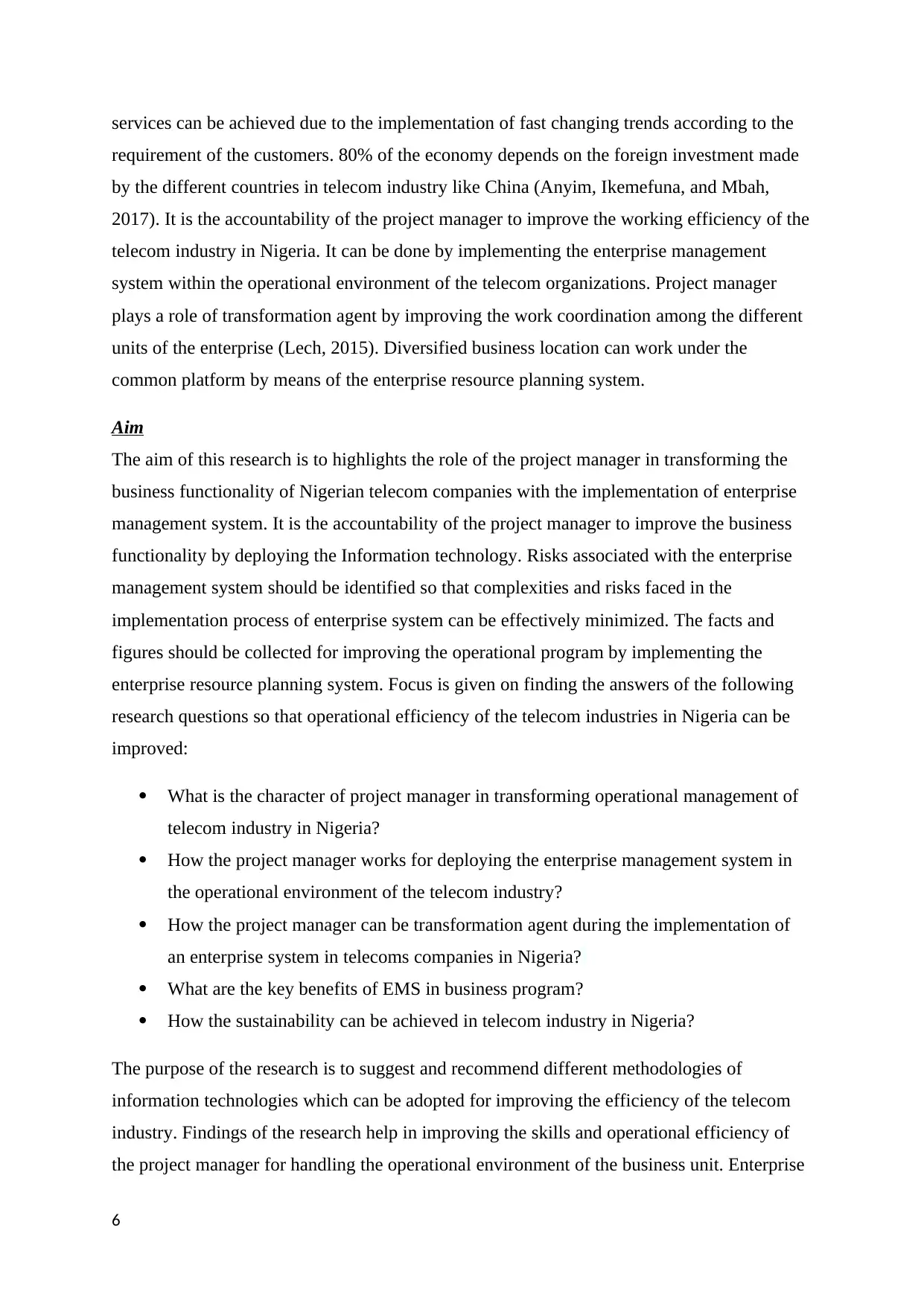
services can be achieved due to the implementation of fast changing trends according to the
requirement of the customers. 80% of the economy depends on the foreign investment made
by the different countries in telecom industry like China (Anyim, Ikemefuna, and Mbah,
2017). It is the accountability of the project manager to improve the working efficiency of the
telecom industry in Nigeria. It can be done by implementing the enterprise management
system within the operational environment of the telecom organizations. Project manager
plays a role of transformation agent by improving the work coordination among the different
units of the enterprise (Lech, 2015). Diversified business location can work under the
common platform by means of the enterprise resource planning system.
Aim
The aim of this research is to highlights the role of the project manager in transforming the
business functionality of Nigerian telecom companies with the implementation of enterprise
management system. It is the accountability of the project manager to improve the business
functionality by deploying the Information technology. Risks associated with the enterprise
management system should be identified so that complexities and risks faced in the
implementation process of enterprise system can be effectively minimized. The facts and
figures should be collected for improving the operational program by implementing the
enterprise resource planning system. Focus is given on finding the answers of the following
research questions so that operational efficiency of the telecom industries in Nigeria can be
improved:
What is the character of project manager in transforming operational management of
telecom industry in Nigeria?
How the project manager works for deploying the enterprise management system in
the operational environment of the telecom industry?
How the project manager can be transformation agent during the implementation of
an enterprise system in telecoms companies in Nigeria?
What are the key benefits of EMS in business program?
How the sustainability can be achieved in telecom industry in Nigeria?
The purpose of the research is to suggest and recommend different methodologies of
information technologies which can be adopted for improving the efficiency of the telecom
industry. Findings of the research help in improving the skills and operational efficiency of
the project manager for handling the operational environment of the business unit. Enterprise
6
requirement of the customers. 80% of the economy depends on the foreign investment made
by the different countries in telecom industry like China (Anyim, Ikemefuna, and Mbah,
2017). It is the accountability of the project manager to improve the working efficiency of the
telecom industry in Nigeria. It can be done by implementing the enterprise management
system within the operational environment of the telecom organizations. Project manager
plays a role of transformation agent by improving the work coordination among the different
units of the enterprise (Lech, 2015). Diversified business location can work under the
common platform by means of the enterprise resource planning system.
Aim
The aim of this research is to highlights the role of the project manager in transforming the
business functionality of Nigerian telecom companies with the implementation of enterprise
management system. It is the accountability of the project manager to improve the business
functionality by deploying the Information technology. Risks associated with the enterprise
management system should be identified so that complexities and risks faced in the
implementation process of enterprise system can be effectively minimized. The facts and
figures should be collected for improving the operational program by implementing the
enterprise resource planning system. Focus is given on finding the answers of the following
research questions so that operational efficiency of the telecom industries in Nigeria can be
improved:
What is the character of project manager in transforming operational management of
telecom industry in Nigeria?
How the project manager works for deploying the enterprise management system in
the operational environment of the telecom industry?
How the project manager can be transformation agent during the implementation of
an enterprise system in telecoms companies in Nigeria?
What are the key benefits of EMS in business program?
How the sustainability can be achieved in telecom industry in Nigeria?
The purpose of the research is to suggest and recommend different methodologies of
information technologies which can be adopted for improving the efficiency of the telecom
industry. Findings of the research help in improving the skills and operational efficiency of
the project manager for handling the operational environment of the business unit. Enterprise
6
Paraphrase This Document
Need a fresh take? Get an instant paraphrase of this document with our AI Paraphraser
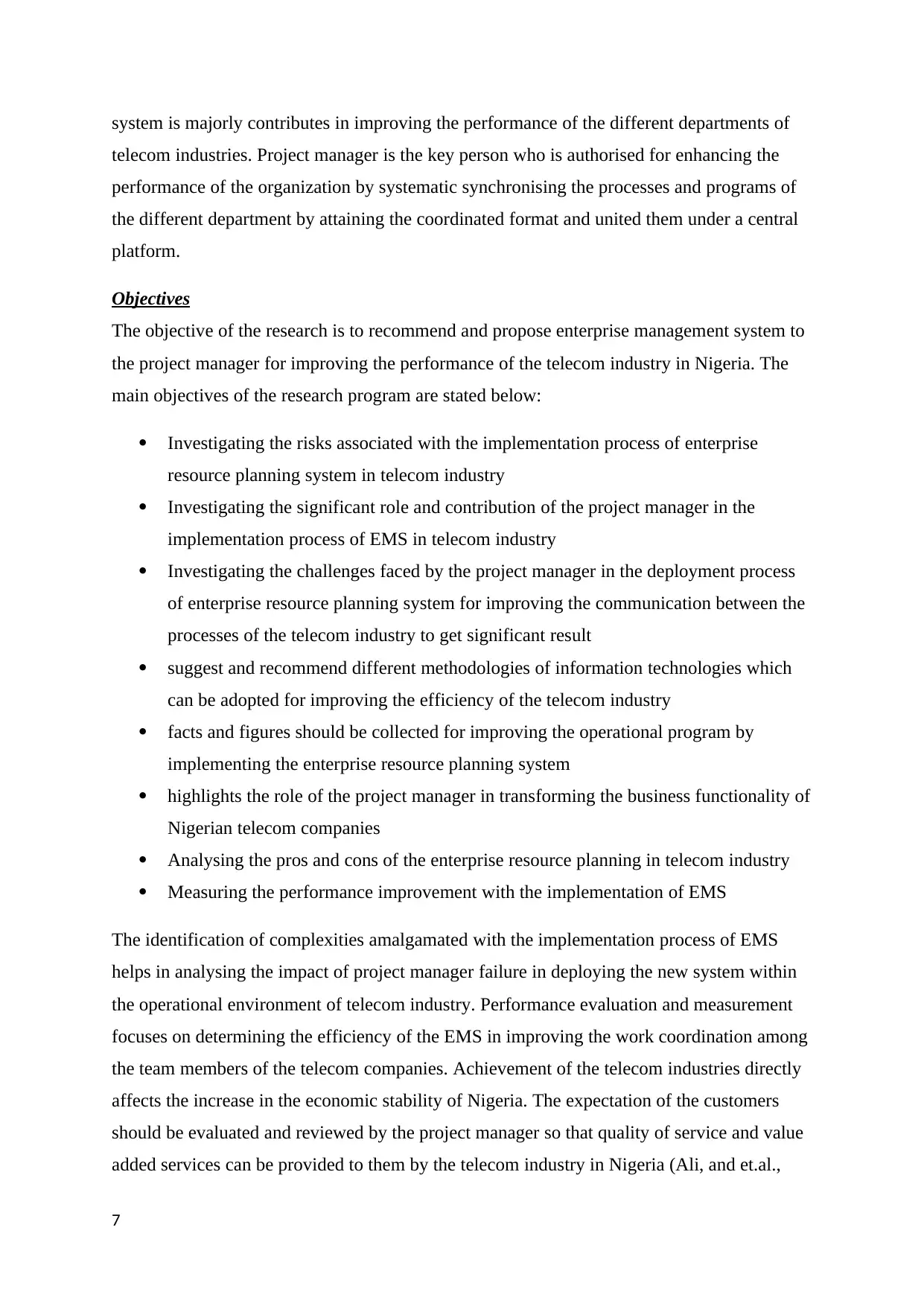
system is majorly contributes in improving the performance of the different departments of
telecom industries. Project manager is the key person who is authorised for enhancing the
performance of the organization by systematic synchronising the processes and programs of
the different department by attaining the coordinated format and united them under a central
platform.
Objectives
The objective of the research is to recommend and propose enterprise management system to
the project manager for improving the performance of the telecom industry in Nigeria. The
main objectives of the research program are stated below:
Investigating the risks associated with the implementation process of enterprise
resource planning system in telecom industry
Investigating the significant role and contribution of the project manager in the
implementation process of EMS in telecom industry
Investigating the challenges faced by the project manager in the deployment process
of enterprise resource planning system for improving the communication between the
processes of the telecom industry to get significant result
suggest and recommend different methodologies of information technologies which
can be adopted for improving the efficiency of the telecom industry
facts and figures should be collected for improving the operational program by
implementing the enterprise resource planning system
highlights the role of the project manager in transforming the business functionality of
Nigerian telecom companies
Analysing the pros and cons of the enterprise resource planning in telecom industry
Measuring the performance improvement with the implementation of EMS
The identification of complexities amalgamated with the implementation process of EMS
helps in analysing the impact of project manager failure in deploying the new system within
the operational environment of telecom industry. Performance evaluation and measurement
focuses on determining the efficiency of the EMS in improving the work coordination among
the team members of the telecom companies. Achievement of the telecom industries directly
affects the increase in the economic stability of Nigeria. The expectation of the customers
should be evaluated and reviewed by the project manager so that quality of service and value
added services can be provided to them by the telecom industry in Nigeria (Ali, and et.al.,
7
telecom industries. Project manager is the key person who is authorised for enhancing the
performance of the organization by systematic synchronising the processes and programs of
the different department by attaining the coordinated format and united them under a central
platform.
Objectives
The objective of the research is to recommend and propose enterprise management system to
the project manager for improving the performance of the telecom industry in Nigeria. The
main objectives of the research program are stated below:
Investigating the risks associated with the implementation process of enterprise
resource planning system in telecom industry
Investigating the significant role and contribution of the project manager in the
implementation process of EMS in telecom industry
Investigating the challenges faced by the project manager in the deployment process
of enterprise resource planning system for improving the communication between the
processes of the telecom industry to get significant result
suggest and recommend different methodologies of information technologies which
can be adopted for improving the efficiency of the telecom industry
facts and figures should be collected for improving the operational program by
implementing the enterprise resource planning system
highlights the role of the project manager in transforming the business functionality of
Nigerian telecom companies
Analysing the pros and cons of the enterprise resource planning in telecom industry
Measuring the performance improvement with the implementation of EMS
The identification of complexities amalgamated with the implementation process of EMS
helps in analysing the impact of project manager failure in deploying the new system within
the operational environment of telecom industry. Performance evaluation and measurement
focuses on determining the efficiency of the EMS in improving the work coordination among
the team members of the telecom companies. Achievement of the telecom industries directly
affects the increase in the economic stability of Nigeria. The expectation of the customers
should be evaluated and reviewed by the project manager so that quality of service and value
added services can be provided to them by the telecom industry in Nigeria (Ali, and et.al.,
7
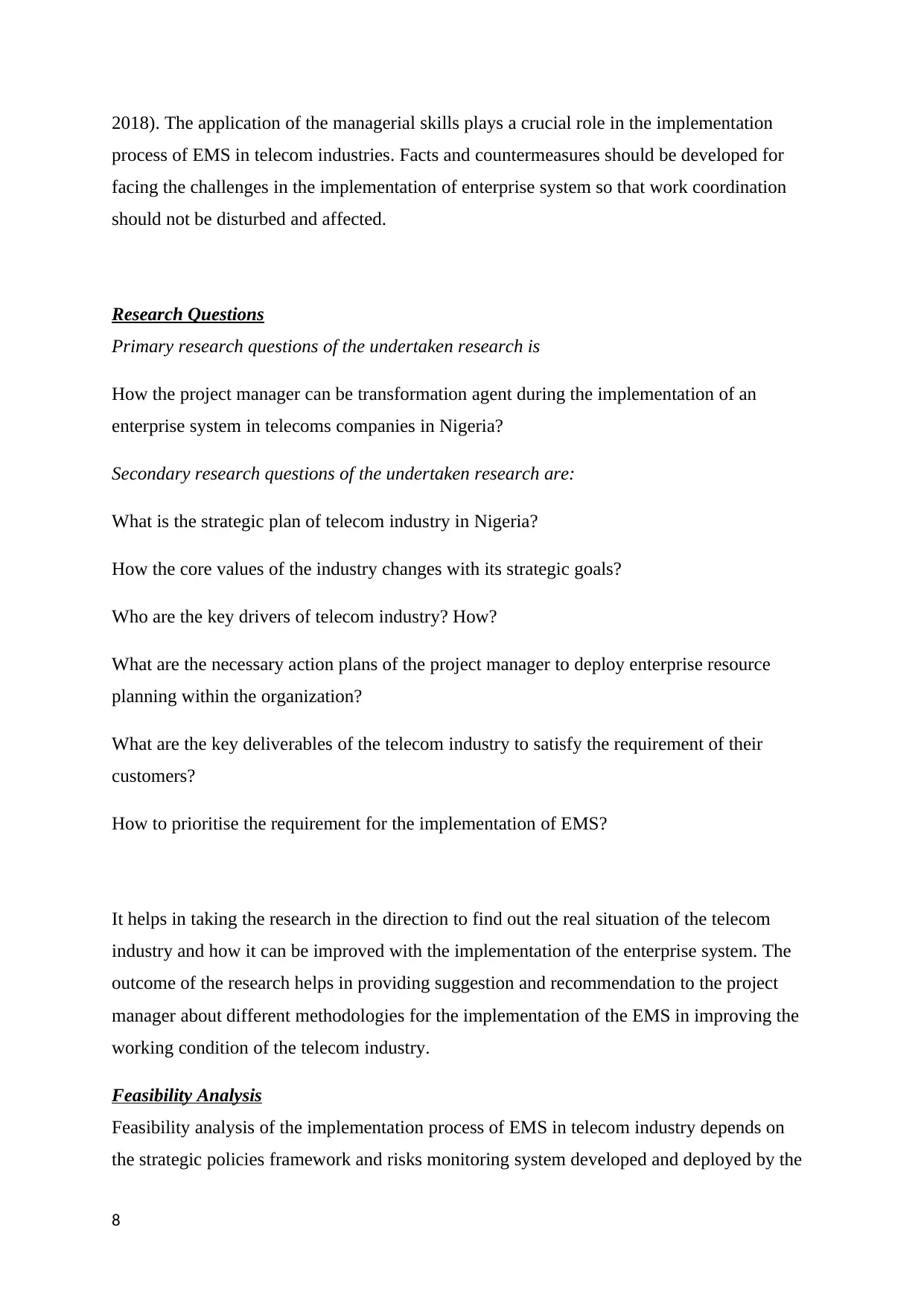
2018). The application of the managerial skills plays a crucial role in the implementation
process of EMS in telecom industries. Facts and countermeasures should be developed for
facing the challenges in the implementation of enterprise system so that work coordination
should not be disturbed and affected.
Research Questions
Primary research questions of the undertaken research is
How the project manager can be transformation agent during the implementation of an
enterprise system in telecoms companies in Nigeria?
Secondary research questions of the undertaken research are:
What is the strategic plan of telecom industry in Nigeria?
How the core values of the industry changes with its strategic goals?
Who are the key drivers of telecom industry? How?
What are the necessary action plans of the project manager to deploy enterprise resource
planning within the organization?
What are the key deliverables of the telecom industry to satisfy the requirement of their
customers?
How to prioritise the requirement for the implementation of EMS?
It helps in taking the research in the direction to find out the real situation of the telecom
industry and how it can be improved with the implementation of the enterprise system. The
outcome of the research helps in providing suggestion and recommendation to the project
manager about different methodologies for the implementation of the EMS in improving the
working condition of the telecom industry.
Feasibility Analysis
Feasibility analysis of the implementation process of EMS in telecom industry depends on
the strategic policies framework and risks monitoring system developed and deployed by the
8
process of EMS in telecom industries. Facts and countermeasures should be developed for
facing the challenges in the implementation of enterprise system so that work coordination
should not be disturbed and affected.
Research Questions
Primary research questions of the undertaken research is
How the project manager can be transformation agent during the implementation of an
enterprise system in telecoms companies in Nigeria?
Secondary research questions of the undertaken research are:
What is the strategic plan of telecom industry in Nigeria?
How the core values of the industry changes with its strategic goals?
Who are the key drivers of telecom industry? How?
What are the necessary action plans of the project manager to deploy enterprise resource
planning within the organization?
What are the key deliverables of the telecom industry to satisfy the requirement of their
customers?
How to prioritise the requirement for the implementation of EMS?
It helps in taking the research in the direction to find out the real situation of the telecom
industry and how it can be improved with the implementation of the enterprise system. The
outcome of the research helps in providing suggestion and recommendation to the project
manager about different methodologies for the implementation of the EMS in improving the
working condition of the telecom industry.
Feasibility Analysis
Feasibility analysis of the implementation process of EMS in telecom industry depends on
the strategic policies framework and risks monitoring system developed and deployed by the
8
⊘ This is a preview!⊘
Do you want full access?
Subscribe today to unlock all pages.

Trusted by 1+ million students worldwide
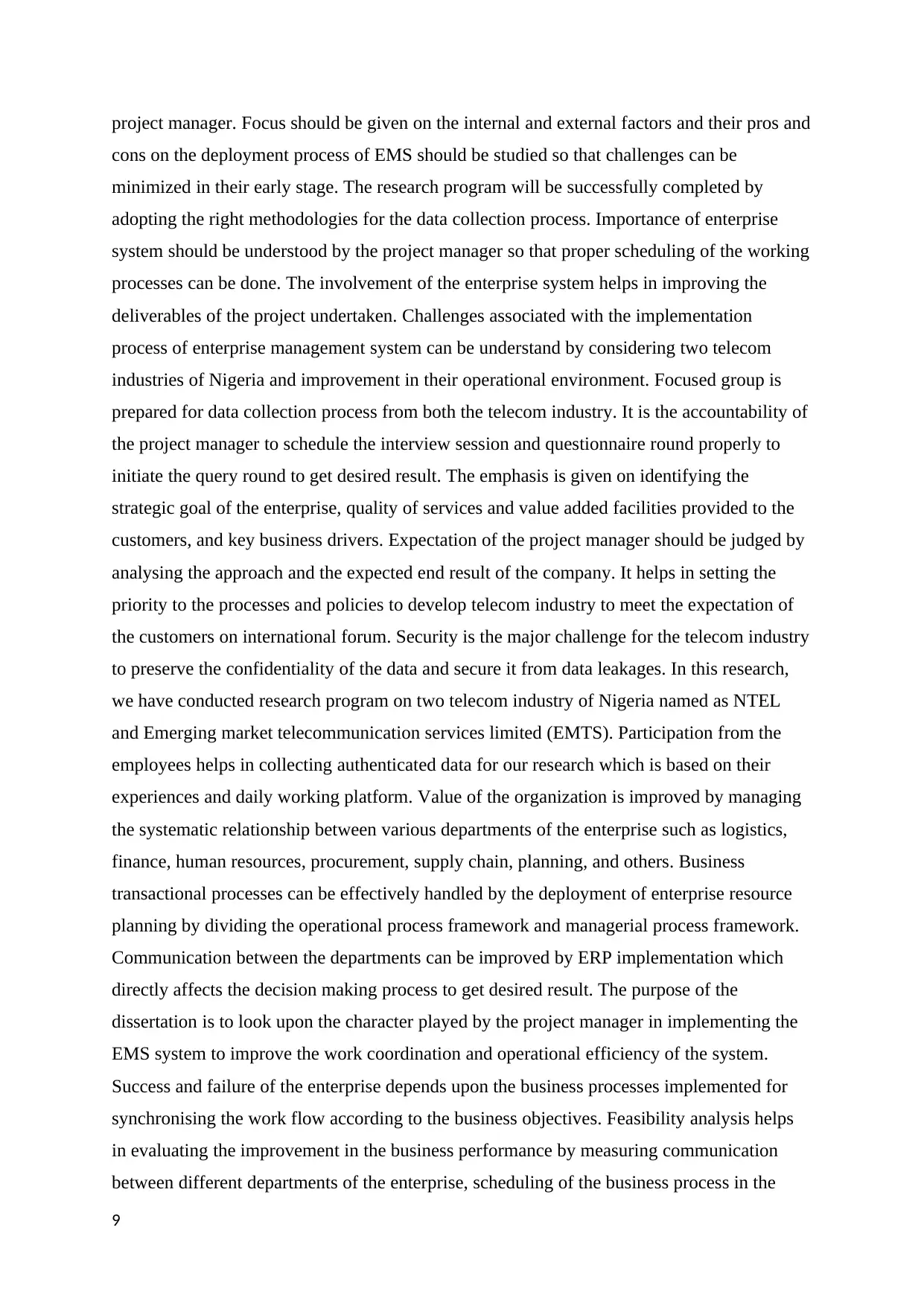
project manager. Focus should be given on the internal and external factors and their pros and
cons on the deployment process of EMS should be studied so that challenges can be
minimized in their early stage. The research program will be successfully completed by
adopting the right methodologies for the data collection process. Importance of enterprise
system should be understood by the project manager so that proper scheduling of the working
processes can be done. The involvement of the enterprise system helps in improving the
deliverables of the project undertaken. Challenges associated with the implementation
process of enterprise management system can be understand by considering two telecom
industries of Nigeria and improvement in their operational environment. Focused group is
prepared for data collection process from both the telecom industry. It is the accountability of
the project manager to schedule the interview session and questionnaire round properly to
initiate the query round to get desired result. The emphasis is given on identifying the
strategic goal of the enterprise, quality of services and value added facilities provided to the
customers, and key business drivers. Expectation of the project manager should be judged by
analysing the approach and the expected end result of the company. It helps in setting the
priority to the processes and policies to develop telecom industry to meet the expectation of
the customers on international forum. Security is the major challenge for the telecom industry
to preserve the confidentiality of the data and secure it from data leakages. In this research,
we have conducted research program on two telecom industry of Nigeria named as NTEL
and Emerging market telecommunication services limited (EMTS). Participation from the
employees helps in collecting authenticated data for our research which is based on their
experiences and daily working platform. Value of the organization is improved by managing
the systematic relationship between various departments of the enterprise such as logistics,
finance, human resources, procurement, supply chain, planning, and others. Business
transactional processes can be effectively handled by the deployment of enterprise resource
planning by dividing the operational process framework and managerial process framework.
Communication between the departments can be improved by ERP implementation which
directly affects the decision making process to get desired result. The purpose of the
dissertation is to look upon the character played by the project manager in implementing the
EMS system to improve the work coordination and operational efficiency of the system.
Success and failure of the enterprise depends upon the business processes implemented for
synchronising the work flow according to the business objectives. Feasibility analysis helps
in evaluating the improvement in the business performance by measuring communication
between different departments of the enterprise, scheduling of the business process in the
9
cons on the deployment process of EMS should be studied so that challenges can be
minimized in their early stage. The research program will be successfully completed by
adopting the right methodologies for the data collection process. Importance of enterprise
system should be understood by the project manager so that proper scheduling of the working
processes can be done. The involvement of the enterprise system helps in improving the
deliverables of the project undertaken. Challenges associated with the implementation
process of enterprise management system can be understand by considering two telecom
industries of Nigeria and improvement in their operational environment. Focused group is
prepared for data collection process from both the telecom industry. It is the accountability of
the project manager to schedule the interview session and questionnaire round properly to
initiate the query round to get desired result. The emphasis is given on identifying the
strategic goal of the enterprise, quality of services and value added facilities provided to the
customers, and key business drivers. Expectation of the project manager should be judged by
analysing the approach and the expected end result of the company. It helps in setting the
priority to the processes and policies to develop telecom industry to meet the expectation of
the customers on international forum. Security is the major challenge for the telecom industry
to preserve the confidentiality of the data and secure it from data leakages. In this research,
we have conducted research program on two telecom industry of Nigeria named as NTEL
and Emerging market telecommunication services limited (EMTS). Participation from the
employees helps in collecting authenticated data for our research which is based on their
experiences and daily working platform. Value of the organization is improved by managing
the systematic relationship between various departments of the enterprise such as logistics,
finance, human resources, procurement, supply chain, planning, and others. Business
transactional processes can be effectively handled by the deployment of enterprise resource
planning by dividing the operational process framework and managerial process framework.
Communication between the departments can be improved by ERP implementation which
directly affects the decision making process to get desired result. The purpose of the
dissertation is to look upon the character played by the project manager in implementing the
EMS system to improve the work coordination and operational efficiency of the system.
Success and failure of the enterprise depends upon the business processes implemented for
synchronising the work flow according to the business objectives. Feasibility analysis helps
in evaluating the improvement in the business performance by measuring communication
between different departments of the enterprise, scheduling of the business process in the
9
Paraphrase This Document
Need a fresh take? Get an instant paraphrase of this document with our AI Paraphraser
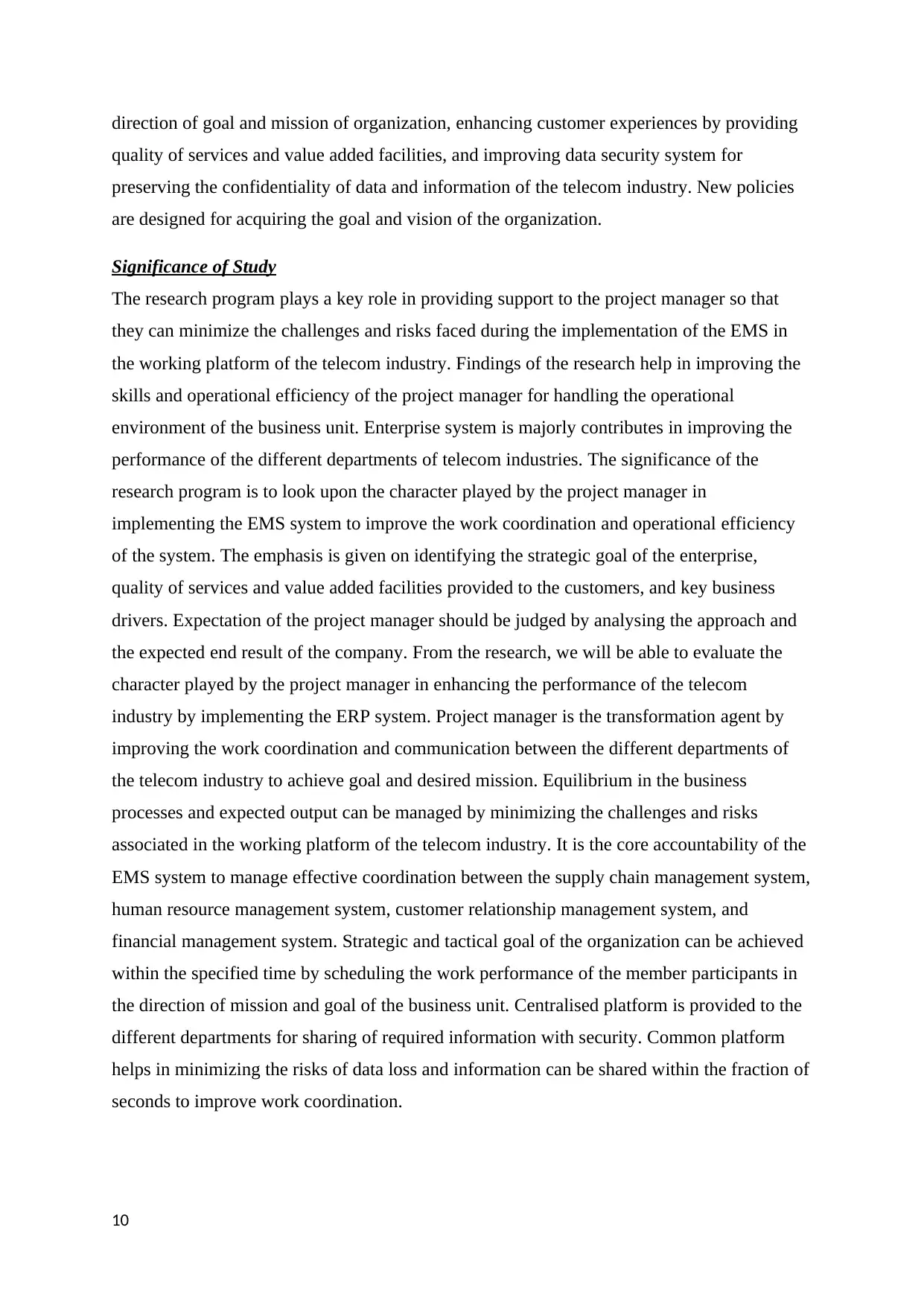
direction of goal and mission of organization, enhancing customer experiences by providing
quality of services and value added facilities, and improving data security system for
preserving the confidentiality of data and information of the telecom industry. New policies
are designed for acquiring the goal and vision of the organization.
Significance of Study
The research program plays a key role in providing support to the project manager so that
they can minimize the challenges and risks faced during the implementation of the EMS in
the working platform of the telecom industry. Findings of the research help in improving the
skills and operational efficiency of the project manager for handling the operational
environment of the business unit. Enterprise system is majorly contributes in improving the
performance of the different departments of telecom industries. The significance of the
research program is to look upon the character played by the project manager in
implementing the EMS system to improve the work coordination and operational efficiency
of the system. The emphasis is given on identifying the strategic goal of the enterprise,
quality of services and value added facilities provided to the customers, and key business
drivers. Expectation of the project manager should be judged by analysing the approach and
the expected end result of the company. From the research, we will be able to evaluate the
character played by the project manager in enhancing the performance of the telecom
industry by implementing the ERP system. Project manager is the transformation agent by
improving the work coordination and communication between the different departments of
the telecom industry to achieve goal and desired mission. Equilibrium in the business
processes and expected output can be managed by minimizing the challenges and risks
associated in the working platform of the telecom industry. It is the core accountability of the
EMS system to manage effective coordination between the supply chain management system,
human resource management system, customer relationship management system, and
financial management system. Strategic and tactical goal of the organization can be achieved
within the specified time by scheduling the work performance of the member participants in
the direction of mission and goal of the business unit. Centralised platform is provided to the
different departments for sharing of required information with security. Common platform
helps in minimizing the risks of data loss and information can be shared within the fraction of
seconds to improve work coordination.
10
quality of services and value added facilities, and improving data security system for
preserving the confidentiality of data and information of the telecom industry. New policies
are designed for acquiring the goal and vision of the organization.
Significance of Study
The research program plays a key role in providing support to the project manager so that
they can minimize the challenges and risks faced during the implementation of the EMS in
the working platform of the telecom industry. Findings of the research help in improving the
skills and operational efficiency of the project manager for handling the operational
environment of the business unit. Enterprise system is majorly contributes in improving the
performance of the different departments of telecom industries. The significance of the
research program is to look upon the character played by the project manager in
implementing the EMS system to improve the work coordination and operational efficiency
of the system. The emphasis is given on identifying the strategic goal of the enterprise,
quality of services and value added facilities provided to the customers, and key business
drivers. Expectation of the project manager should be judged by analysing the approach and
the expected end result of the company. From the research, we will be able to evaluate the
character played by the project manager in enhancing the performance of the telecom
industry by implementing the ERP system. Project manager is the transformation agent by
improving the work coordination and communication between the different departments of
the telecom industry to achieve goal and desired mission. Equilibrium in the business
processes and expected output can be managed by minimizing the challenges and risks
associated in the working platform of the telecom industry. It is the core accountability of the
EMS system to manage effective coordination between the supply chain management system,
human resource management system, customer relationship management system, and
financial management system. Strategic and tactical goal of the organization can be achieved
within the specified time by scheduling the work performance of the member participants in
the direction of mission and goal of the business unit. Centralised platform is provided to the
different departments for sharing of required information with security. Common platform
helps in minimizing the risks of data loss and information can be shared within the fraction of
seconds to improve work coordination.
10
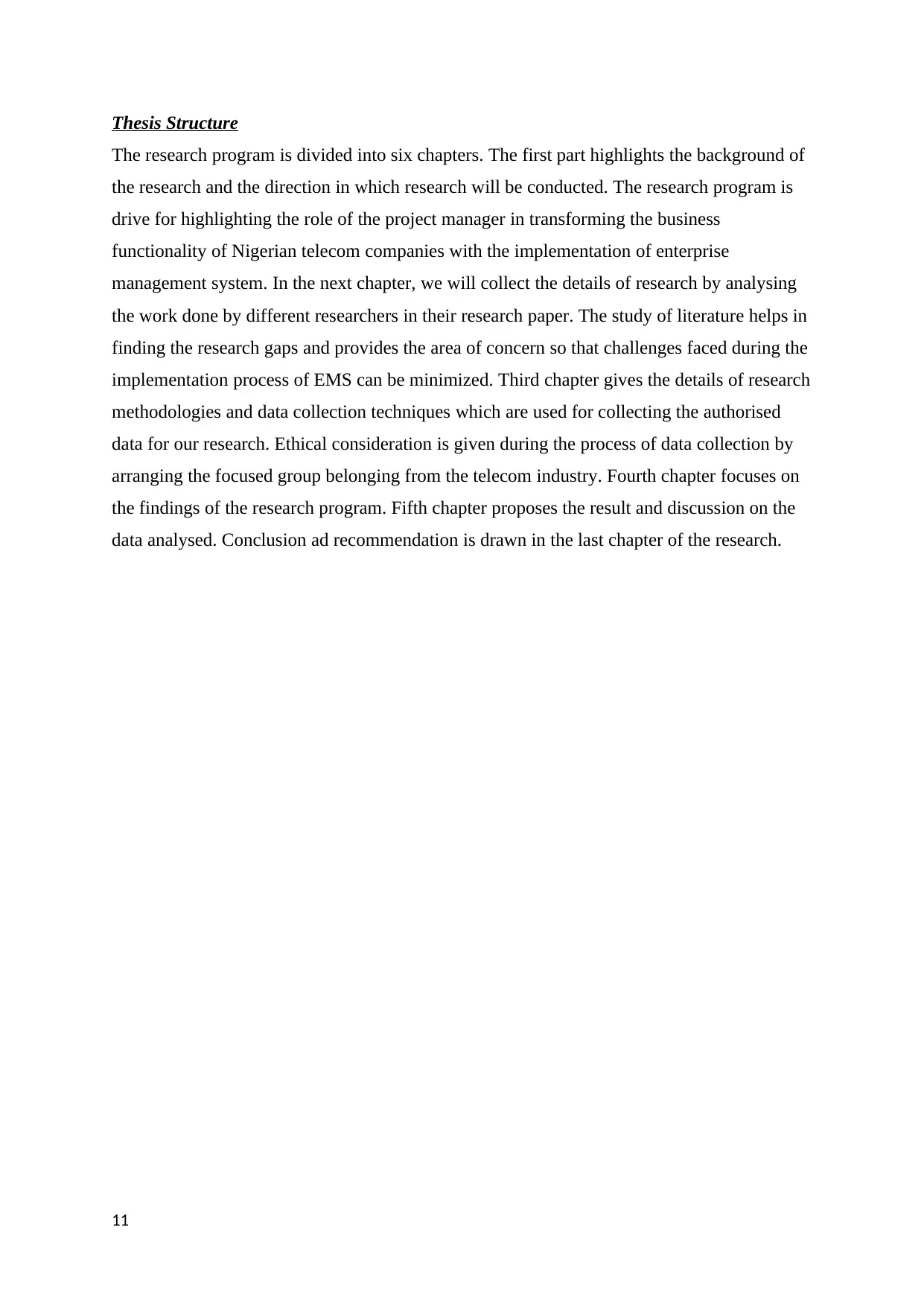
Thesis Structure
The research program is divided into six chapters. The first part highlights the background of
the research and the direction in which research will be conducted. The research program is
drive for highlighting the role of the project manager in transforming the business
functionality of Nigerian telecom companies with the implementation of enterprise
management system. In the next chapter, we will collect the details of research by analysing
the work done by different researchers in their research paper. The study of literature helps in
finding the research gaps and provides the area of concern so that challenges faced during the
implementation process of EMS can be minimized. Third chapter gives the details of research
methodologies and data collection techniques which are used for collecting the authorised
data for our research. Ethical consideration is given during the process of data collection by
arranging the focused group belonging from the telecom industry. Fourth chapter focuses on
the findings of the research program. Fifth chapter proposes the result and discussion on the
data analysed. Conclusion ad recommendation is drawn in the last chapter of the research.
11
The research program is divided into six chapters. The first part highlights the background of
the research and the direction in which research will be conducted. The research program is
drive for highlighting the role of the project manager in transforming the business
functionality of Nigerian telecom companies with the implementation of enterprise
management system. In the next chapter, we will collect the details of research by analysing
the work done by different researchers in their research paper. The study of literature helps in
finding the research gaps and provides the area of concern so that challenges faced during the
implementation process of EMS can be minimized. Third chapter gives the details of research
methodologies and data collection techniques which are used for collecting the authorised
data for our research. Ethical consideration is given during the process of data collection by
arranging the focused group belonging from the telecom industry. Fourth chapter focuses on
the findings of the research program. Fifth chapter proposes the result and discussion on the
data analysed. Conclusion ad recommendation is drawn in the last chapter of the research.
11
⊘ This is a preview!⊘
Do you want full access?
Subscribe today to unlock all pages.

Trusted by 1+ million students worldwide
1 out of 89
Related Documents
Your All-in-One AI-Powered Toolkit for Academic Success.
+13062052269
info@desklib.com
Available 24*7 on WhatsApp / Email
![[object Object]](/_next/static/media/star-bottom.7253800d.svg)
Unlock your academic potential
Copyright © 2020–2026 A2Z Services. All Rights Reserved. Developed and managed by ZUCOL.





